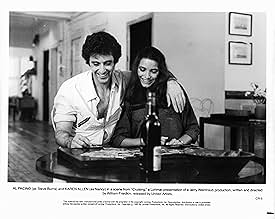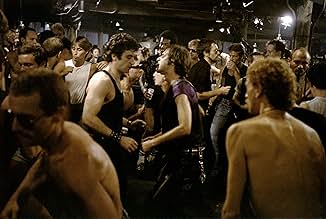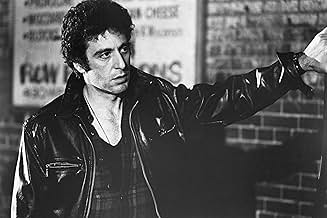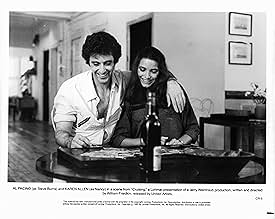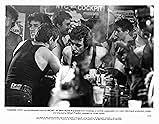NOTE IMDb
6,5/10
31 k
MA NOTE
Un inspecteur de police s'infiltre dans la sous-culture homosexuelle S&M de New York pour attraper un tueur en série qui s'attaque aux homosexuels.Un inspecteur de police s'infiltre dans la sous-culture homosexuelle S&M de New York pour attraper un tueur en série qui s'attaque aux homosexuels.Un inspecteur de police s'infiltre dans la sous-culture homosexuelle S&M de New York pour attraper un tueur en série qui s'attaque aux homosexuels.
- Réalisation
- Scénario
- Casting principal
- Récompenses
- 5 nominations au total
Ed O'Neill
- Det. Schreiber
- (as Edward O'Neil)
Avis à la une
Viewed today, "Cruising" still elicits intense responses from both Gay and straight viewers alike. Mainstream Gays lament, as many protestors of the film at the time of its release, that it shows a homophobic image of Gay life, depecting them as sex-obsessed. Straights are put off by the frank look at the Gay sex "cruising" culture.
Interesting, however, some of the people involved in the Leather/SM subculture at the time this film was made have praised it for its accuracy of this particular lifestyle -- a pre-AIDS lifestyle concentrated on quick sex that was (and still is) pursued by a segment of the Gay community.
The film does not pretend to depict Gays as a whole. It is just a drama about a police investigation that uses the scene as a background and catalyst for an exploration into how one cop is affected by his work.
Not the greatest film ever made, but certainly a good springboard for discussion about the Gay community's politics, when one fully examines the controversy surrounding the film and the continued debate over public sex and body image in the community.
The strengths of "Cruising" are its use of locales and documentary-style cinematography, as well as the interesting performance from Paccino. In the end, it is hampered as a drama by problems with the narrative structure of the piece that seems to fizzle out in the last act, leading to an intriguing, but inconclusive, finish.
Interesting, however, some of the people involved in the Leather/SM subculture at the time this film was made have praised it for its accuracy of this particular lifestyle -- a pre-AIDS lifestyle concentrated on quick sex that was (and still is) pursued by a segment of the Gay community.
The film does not pretend to depict Gays as a whole. It is just a drama about a police investigation that uses the scene as a background and catalyst for an exploration into how one cop is affected by his work.
Not the greatest film ever made, but certainly a good springboard for discussion about the Gay community's politics, when one fully examines the controversy surrounding the film and the continued debate over public sex and body image in the community.
The strengths of "Cruising" are its use of locales and documentary-style cinematography, as well as the interesting performance from Paccino. In the end, it is hampered as a drama by problems with the narrative structure of the piece that seems to fizzle out in the last act, leading to an intriguing, but inconclusive, finish.
When body parts of men start showing up in the Hudson River, police come to believe a serial killer is targeting gay men. Under intense pressure from the media, gay advocacy groups, the city's elected officials, Steve Burns (Al Pacino) is assigned to go undercover in the fringe S&M gay scene as he has a similar profile and build to the men being killed. As Steve adopts the alias of John Forbes, he finds himself further and further entrenched and drawn to the lurid allure of the scene.
Based on the 1970 novel Cruising by Gerald Walker, French Connection producer Philip D'Antoni had approached Friedkin earlier in his career only for Friedkin to turn it down due to lack of interest. D'Antoni then approached Steven Spielberg, but was unable to find studio backing. When the rights were bought by Jerry Weintraub years later, Friedkin had warmed up to the idea thanks to his exposure to a series of articles by Village Voice writer Arthur Bell as well as encounters with former police officer Randy Jurgensen who had done similar deep cover work to investigate a series of gay murders. Not only was the film prone to frequent conflicts with the MPAA to secure an R rating with nearly 40 minutes of deleted footage of explicit material in the various bars, but the film was also subject to massive protests and pickets from gay rights groups who characterized the film as homophobic and anti-gay. In the years since it's troubled release the film continues to be discussed and has found appreciation among directors such as the Safdie brothers, Nicholas Winding Refn, and Quentin Tarantino.
The movie is very giallo like with its lurid sexualized murders which are investigated in a way where the film is more concerned with crafting an atmosphere and sense of character as Friedkin captures the seamy side of New York's nightlife. While Al Pacino does well playing the audience proxy as he reacts to the world crafted by Friedkin's film, there is a sense that Pacino is a bit more secured in his sexuality than the filmmakers intended. As an experience the film is simply unforgettable.
William Friedkin's Cruising is a tense and thrilling film that captures its lurid atmosphere so vividly you can feel it with every scene. While the movie's loose structure and ambiguous payoffs will challenge viewers, in terms of craft of filmmaking Cruising has few equals.
Based on the 1970 novel Cruising by Gerald Walker, French Connection producer Philip D'Antoni had approached Friedkin earlier in his career only for Friedkin to turn it down due to lack of interest. D'Antoni then approached Steven Spielberg, but was unable to find studio backing. When the rights were bought by Jerry Weintraub years later, Friedkin had warmed up to the idea thanks to his exposure to a series of articles by Village Voice writer Arthur Bell as well as encounters with former police officer Randy Jurgensen who had done similar deep cover work to investigate a series of gay murders. Not only was the film prone to frequent conflicts with the MPAA to secure an R rating with nearly 40 minutes of deleted footage of explicit material in the various bars, but the film was also subject to massive protests and pickets from gay rights groups who characterized the film as homophobic and anti-gay. In the years since it's troubled release the film continues to be discussed and has found appreciation among directors such as the Safdie brothers, Nicholas Winding Refn, and Quentin Tarantino.
The movie is very giallo like with its lurid sexualized murders which are investigated in a way where the film is more concerned with crafting an atmosphere and sense of character as Friedkin captures the seamy side of New York's nightlife. While Al Pacino does well playing the audience proxy as he reacts to the world crafted by Friedkin's film, there is a sense that Pacino is a bit more secured in his sexuality than the filmmakers intended. As an experience the film is simply unforgettable.
William Friedkin's Cruising is a tense and thrilling film that captures its lurid atmosphere so vividly you can feel it with every scene. While the movie's loose structure and ambiguous payoffs will challenge viewers, in terms of craft of filmmaking Cruising has few equals.
William Friedkin is a mysterious, often mystifying film-maker. Although he rose to prominence at the same time as the rest of the so-called 'movie brat' generation of directors (Coppola, Spielberg, Scorsese, DePalma, et al.), he stands apart, even from a group as essentially disparate as this one. For one thing, his films lack the intertextual references and cinematic stylisation common to most of the other members. If he has an over-riding aesthetic, it would be the ugliness of the majority of human existence. He's not interested in prettifying his images or indulging in style-for-style's sake; which is not to say that his film's don't exhibit inventive and effective technique, just that this technique is always at the service of the story he's telling, and is often blunt and brutally effective in it's employment. All of this no doubt arises from his start in documentary film-making. Friedkin is particularly good at depicting the menace of urban environments, and the locales of a lot of his films are frightening, tangibly real places. Witness the sequences involving Karras' aged mother in 'The Exorcist', which for me are the most disturbing scenes in an often terrifying film. As we observe the elderly lady living alone in her shabby apartment in a crime-ridden neighbourhood, we realise that this is the existence that many millions of people are forced to endure, and it's oppressiveness adds immeasurably to the psychological impact of the film as a whole. We share Karras' fear and traumatising guilt that she died alone in such circumstances, and the special effects trickery of the climax is lent a genuine resonance.
Because of the stark, seemingly 'artless' force and apparent misanthropy of much of his work, a number of otherwise perceptive commentators dislike Friedkin intensely. Pauline Kael was extremely cool about 'The French Connection' and absolutely hated 'The Exorcist'. David Thompson described him as "essentially incompetent", bludgeoning the audience with blatant and obvious effects. In fact, Friedkin's best work is highly sophisticated in it's use of sound and music, and employs often visceral imagery to telling and subversive effect. However, some of his films ARE genuinely bloody awful, or at least depressingly mediocre. The very inconsistency of his work lies at the centre of the mystery that is his career. He seems to me to be a fiercely intelligent man whose art is driven by his life rather than the culture of film, and whose reportedly quixotic, often self-destructive personality in no small measure accounts for the expansive peaks and troughs of his cinematic achievements.
Friedkin has reassuring or comforting his audience way down the list of his priorities. In the case of 'Cruising', he neglected to add them at all. Because of this, 'Cruising' is a very difficult film to watch. Most film-makers, were they making a film set in such an alien and frightening environment, would go overboard on providing us with at least one protagonist we could identify with. But Friedkin takes the very opposite route and presents us entirely with characters who are abhorrent, sleazy or totally ambiguous. Indeed, ambiguity is the film's raison d'etre - we are never sure of anything, and this becomes both the pictures great strength and source of much audience frustration. It seems that unlike, say, Spielberg, who continually seeks the approbation of his audience, Friedkin actively resents his (or rather, their preconceptions and certainties), leading him to consistently challenge and upset them. This can be exciting to those who value such seditious manouveres, but dispiriting and destabilising for those that don't.
The major problem with evaluating 'Cruising' is that the film as it currently exists is seriously incomplete (apparently having been shorn of some 40 minutes of footage by the censors!). I suspect that a 'directors cut' should it ever emerge, although no doubt clarifying certain issues, would overall fail to dispel the central ambiguity that is so infuriating and troubling to the majority of the audience, and that lies at the heart of Friedkins vision. "What interests me is the very thin line between good and evil", the director once said when asked to provide a thematic overview of his work - and this is the core of 'Cruising'.
I would urge you to watch the film. It is a uniquely dark, brave piece somewhat compromised by well documented production difficulties and the censors scissors. It has a sinister, compelling momentum and wonderfully ugly, grainy textures that seep into your pores leaving you uncomfortable and unsettled. Sometimes a feel-bad movie can be as bracing as a winter morning. 'Cruising' is such an experience, and a fascinating, provocative one at that.
Because of the stark, seemingly 'artless' force and apparent misanthropy of much of his work, a number of otherwise perceptive commentators dislike Friedkin intensely. Pauline Kael was extremely cool about 'The French Connection' and absolutely hated 'The Exorcist'. David Thompson described him as "essentially incompetent", bludgeoning the audience with blatant and obvious effects. In fact, Friedkin's best work is highly sophisticated in it's use of sound and music, and employs often visceral imagery to telling and subversive effect. However, some of his films ARE genuinely bloody awful, or at least depressingly mediocre. The very inconsistency of his work lies at the centre of the mystery that is his career. He seems to me to be a fiercely intelligent man whose art is driven by his life rather than the culture of film, and whose reportedly quixotic, often self-destructive personality in no small measure accounts for the expansive peaks and troughs of his cinematic achievements.
Friedkin has reassuring or comforting his audience way down the list of his priorities. In the case of 'Cruising', he neglected to add them at all. Because of this, 'Cruising' is a very difficult film to watch. Most film-makers, were they making a film set in such an alien and frightening environment, would go overboard on providing us with at least one protagonist we could identify with. But Friedkin takes the very opposite route and presents us entirely with characters who are abhorrent, sleazy or totally ambiguous. Indeed, ambiguity is the film's raison d'etre - we are never sure of anything, and this becomes both the pictures great strength and source of much audience frustration. It seems that unlike, say, Spielberg, who continually seeks the approbation of his audience, Friedkin actively resents his (or rather, their preconceptions and certainties), leading him to consistently challenge and upset them. This can be exciting to those who value such seditious manouveres, but dispiriting and destabilising for those that don't.
The major problem with evaluating 'Cruising' is that the film as it currently exists is seriously incomplete (apparently having been shorn of some 40 minutes of footage by the censors!). I suspect that a 'directors cut' should it ever emerge, although no doubt clarifying certain issues, would overall fail to dispel the central ambiguity that is so infuriating and troubling to the majority of the audience, and that lies at the heart of Friedkins vision. "What interests me is the very thin line between good and evil", the director once said when asked to provide a thematic overview of his work - and this is the core of 'Cruising'.
I would urge you to watch the film. It is a uniquely dark, brave piece somewhat compromised by well documented production difficulties and the censors scissors. It has a sinister, compelling momentum and wonderfully ugly, grainy textures that seep into your pores leaving you uncomfortable and unsettled. Sometimes a feel-bad movie can be as bracing as a winter morning. 'Cruising' is such an experience, and a fascinating, provocative one at that.
What strikes me while watching the film, is that truth to reality is really refreshing. No editing in the world can make up to a camera catching a dark, rainy street as they could back in those days when equipment was not developed. Aristoleles claimed that cruelty should be committed outside the scene, that is, in the background. The imagination of the spectator is far more imaginative than a view of the actual event. Therefore, leaving out is stronger in terms of storytelling than showing. Quite the contrary to contemporary movies, I'd say. The advantage of this story is thus the suspense built up on lack of knowledge. There is no flirting with the audience; you do not know in advance who dunnit. There is no flirting with the audience on the task of staging one of the protagonists as a gay either. This is not the greatest movie, but really worth seeing.
I had the pleasure of seeing this movie recently and I highly recommend it to any people who savor the darker things in life. If I had never seen this movie the reviews left about it everywhere on the net would surely have made me miss it at every opportunity but luckily I only came across them looking for more information after its viewing.
The first thing that really got me was the fantastic soundtrack. This is American punk rock at it's best and most glorious and I cannot think of a more apt context for it than the New York gay S&M scene. This my friends ... is punk-o-rama.
This is not a gay film ... nor is it a porno film ... this is an in your face horror much like William Friedkin's other classic "The Exorcist" ... but not a hammer horror nor a gore filled voyage through some fiery "kissing the devil's ass" hell but a very real slice of a very real life that exists in every major city in the world as well as some smaller ones. This is a film about a world so few know anything about that it is far above common criticism ... yet at the same time the directions and nuances are all too common. I would say that any fans of the movies of David Lynch might enjoy the somewhat lost disenchantment of this flick as it slides further and further into the darkest realms of the grotesque. As well anyone who's enjoyed the backwards pleasures of watching the cult classic "Je'Taime ... Moi Ne Plus" starring Jane Birkin would also find a little gem here.
"Cruisin'" is pure subversive genius.
Futurist-surrealism!
Pure *ART*
The first thing that really got me was the fantastic soundtrack. This is American punk rock at it's best and most glorious and I cannot think of a more apt context for it than the New York gay S&M scene. This my friends ... is punk-o-rama.
This is not a gay film ... nor is it a porno film ... this is an in your face horror much like William Friedkin's other classic "The Exorcist" ... but not a hammer horror nor a gore filled voyage through some fiery "kissing the devil's ass" hell but a very real slice of a very real life that exists in every major city in the world as well as some smaller ones. This is a film about a world so few know anything about that it is far above common criticism ... yet at the same time the directions and nuances are all too common. I would say that any fans of the movies of David Lynch might enjoy the somewhat lost disenchantment of this flick as it slides further and further into the darkest realms of the grotesque. As well anyone who's enjoyed the backwards pleasures of watching the cult classic "Je'Taime ... Moi Ne Plus" starring Jane Birkin would also find a little gem here.
"Cruisin'" is pure subversive genius.
Futurist-surrealism!
Pure *ART*
Le saviez-vous
- AnecdotesTwo of the notorious gay bars featured in the film - Mine Shaft and Eagle's Nest - eventually barred William Friedkin.
- GaffesWhen the first victim gets stabbed blood is shown running off his shoulder but the knife is spotless.
- Citations
Steve Burns: Hips or lips?
- Crédits fousThe film only opens with the title in large letters, across the screen. It is only at the end where the filmmakers are credited.
- Versions alternativesUK cinema and 1987 video versions were cut by 54 secs by the BBFC. The 1997 Maverick Directors video release was cut by 39 seconds to remove subliminal shots of anal sex during the murder scenes (one of which appears in the film though heavily darkened) and to edit a pan shot of a gay bar interior and shots of a knife being traced over a bound victims body. Although the uncut version was shown by Sky TV the film was resubmitted to the BBFC in 2003 for a FilmFour showing and many cuts were restored apart from a 1 sec edit to remove the subliminal shots. For the initial release on UK DVD in 2008 all the cuts were waived.
- Bandes originalesThree-Day Moon
Performed by Barre Phillips
Meilleurs choix
Connectez-vous pour évaluer et suivre la liste de favoris afin de recevoir des recommandations personnalisées
- How long is Cruising?Alimenté par Alexa
Détails
- Date de sortie
- Pays d’origine
- Langue
- Aussi connu sous le nom de
- Encrucijadas
- Lieux de tournage
- Sociétés de production
- Voir plus de crédits d'entreprise sur IMDbPro
Box-office
- Budget
- 11 000 000 $US (estimé)
- Montant brut aux États-Unis et au Canada
- 19 798 718 $US
- Montant brut mondial
- 19 815 555 $US
Contribuer à cette page
Suggérer une modification ou ajouter du contenu manquant


